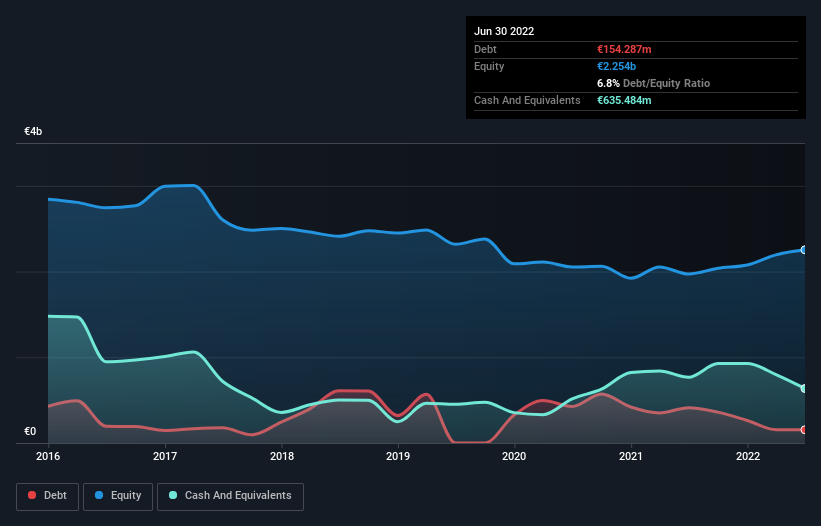
Warren Buffett famously said, 'Volatility is far from synonymous with risk.' When we think about how risky a company is, we always like to look at its use of debt, since debt overload can lead to ruin. As with many other companies GEA Group Aktiengesellschaft (ETR:G1A) makes use of debt. But is this debt a concern to shareholders?
Why Does Debt Bring Risk?
Generally speaking, debt only becomes a real problem when a company can't easily pay it off, either by raising capital or with its own cash flow. Part and parcel of capitalism is the process of 'creative destruction' where failed businesses are mercilessly liquidated by their bankers. However, a more common (but still painful) scenario is that it has to raise new equity capital at a low price, thus permanently diluting shareholders. By replacing dilution, though, debt can be an extremely good tool for businesses that need capital to invest in growth at high rates of return. The first step when considering a company's debt levels is to consider its cash and debt together.
Our analysis indicates that G1A is potentially undervalued!
How Much Debt Does GEA Group Carry?
The image below, which you can click on for greater detail, shows that GEA Group had debt of €154.3m at the end of June 2022, a reduction from €411.9m over a year. However, it does have €635.5m in cash offsetting this, leading to net cash of €481.2m.

How Healthy Is GEA Group's Balance Sheet?
We can see from the most recent balance sheet that GEA Group had liabilities of €2.40b falling due within a year, and liabilities of €1.17b due beyond that. Offsetting these obligations, it had cash of €635.5m as well as receivables valued at €1.15b due within 12 months. So it has liabilities totalling €1.78b more than its cash and near-term receivables, combined.
GEA Group has a market capitalization of €6.06b, so it could very likely raise cash to ameliorate its balance sheet, if the need arose. But it's clear that we should definitely closely examine whether it can manage its debt without dilution. Despite its noteworthy liabilities, GEA Group boasts net cash, so it's fair to say it does not have a heavy debt load!
The good news is that GEA Group has increased its EBIT by 6.3% over twelve months, which should ease any concerns about debt repayment. There's no doubt that we learn most about debt from the balance sheet. But ultimately the future profitability of the business will decide if GEA Group can strengthen its balance sheet over time. So if you're focused on the future you can check out this free report showing analyst profit forecasts.
But our final consideration is also important, because a company cannot pay debt with paper profits; it needs cold hard cash. While GEA Group has net cash on its balance sheet, it's still worth taking a look at its ability to convert earnings before interest and tax (EBIT) to free cash flow, to help us understand how quickly it is building (or eroding) that cash balance. Over the last three years, GEA Group actually produced more free cash flow than EBIT. There's nothing better than incoming cash when it comes to staying in your lenders' good graces.
Summing Up
Although GEA Group's balance sheet isn't particularly strong, due to the total liabilities, it is clearly positive to see that it has net cash of €481.2m. And it impressed us with free cash flow of €395m, being 219% of its EBIT. So we don't think GEA Group's use of debt is risky. Above most other metrics, we think its important to track how fast earnings per share is growing, if at all. If you've also come to that realization, you're in luck, because today you can view this interactive graph of GEA Group's earnings per share history for free.
If, after all that, you're more interested in a fast growing company with a rock-solid balance sheet, then check out our list of net cash growth stocks without delay.
New: Manage All Your Stock Portfolios in One Place
We've created the ultimate portfolio companion for stock investors, and it's free.
• Connect an unlimited number of Portfolios and see your total in one currency
• Be alerted to new Warning Signs or Risks via email or mobile
• Track the Fair Value of your stocks
Have feedback on this article? Concerned about the content? Get in touch with us directly. Alternatively, email editorial-team (at) simplywallst.com.
This article by Simply Wall St is general in nature. We provide commentary based on historical data and analyst forecasts only using an unbiased methodology and our articles are not intended to be financial advice. It does not constitute a recommendation to buy or sell any stock, and does not take account of your objectives, or your financial situation. We aim to bring you long-term focused analysis driven by fundamental data. Note that our analysis may not factor in the latest price-sensitive company announcements or qualitative material. Simply Wall St has no position in any stocks mentioned.
About XTRA:G1A
GEA Group
Engages in the development and production of systems and components to the food, beverage, and pharmaceutical industries.
Flawless balance sheet established dividend payer.


